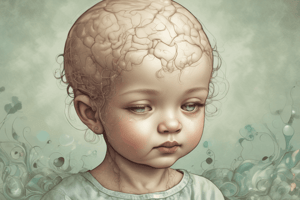Podcast
Questions and Answers
What is a common congenital cause of hydrocephalus in children?
What is a common congenital cause of hydrocephalus in children?
- Genetic defects (correct)
- Premature birth
- Trauma
- Infections
What is a common symptom of hydrocephalus in children?
What is a common symptom of hydrocephalus in children?
- Diarrhea
- Fever
- Constipation
- Seizures (correct)
What is the primary purpose of a lumbar puncture in diagnosing hydrocephalus?
What is the primary purpose of a lumbar puncture in diagnosing hydrocephalus?
- To check for signs of infection
- To visualize the brain and ventricles
- To assess developmental milestones
- To measure cerebrospinal fluid pressure (correct)
What is the primary treatment option for hydrocephalus in children?
What is the primary treatment option for hydrocephalus in children?
What is a complication of premature birth that can lead to hydrocephalus?
What is a complication of premature birth that can lead to hydrocephalus?
What is a symptom of increased intracranial pressure in children with hydrocephalus?
What is a symptom of increased intracranial pressure in children with hydrocephalus?
What is a diagnostic tool used in infants to visualize the brain and ventricles?
What is a diagnostic tool used in infants to visualize the brain and ventricles?
What is a possible cause of hydrocephalus in children due to a brain tumor?
What is a possible cause of hydrocephalus in children due to a brain tumor?
What is a developmental milestone that may be delayed in children with hydrocephalus?
What is a developmental milestone that may be delayed in children with hydrocephalus?
What is a physical examination method used to diagnose hydrocephalus in children?
What is a physical examination method used to diagnose hydrocephalus in children?
Flashcards are hidden until you start studying
Study Notes
Causes of Hydrocephalus in Children
- Genetic defects: Congenital hydrocephalus can occur due to genetic mutations, such as X-linked hydrocephalus, which affects boys more commonly.
- Infections: Meningitis, encephalitis, and other infections can cause inflammation and scarring, leading to hydrocephalus.
- Premature birth: Premature babies are at a higher risk of developing hydrocephalus due to bleeding in the brain or infections.
- Trauma: Head trauma, such as a fall or a car accident, can cause bleeding in the brain, leading to hydrocephalus.
- Tumors: Brain tumors, such as medulloblastoma, can block the flow of cerebrospinal fluid, causing hydrocephalus.
Symptoms of Hydrocephalus in Children
- Increased head size: Rapid increase in head circumference in infants, or sudden increase in head size in older children.
- Vomiting: Projectile vomiting, especially in the morning.
- Seizures: Focal or generalized seizures, which can be a sign of increased pressure in the brain.
- Sleep disturbances: Difficulty sleeping or excessive sleepiness.
- Irritability: Fussiness, crying, or mood changes.
- Developmental delays: Delayed speech, motor skills, or cognitive development.
Diagnosis of Hydrocephalus in Children
- Physical examination: Measuring head circumference, checking for signs of increased intracranial pressure, and assessing developmental milestones.
- Imaging studies:
- Ultrasound: Used in infants to visualize the brain and ventricles.
- CT or MRI scans: Used to visualize the brain and ventricles in older children.
- Lumbar puncture: May be performed to measure cerebrospinal fluid pressure and analyze the fluid for infection or other conditions.
Treatment Options for Hydrocephalus in Children
- Shunt placement: A surgical procedure to insert a shunt that drains excess cerebrospinal fluid from the brain to the abdomen.
- Endoscopic third ventriculostomy (ETV): A minimally invasive surgical procedure to create a hole in the floor of the third ventricle, allowing cerebrospinal fluid to flow freely.
- Medications: May be prescribed to manage symptoms, such as seizures or vomiting, but do not treat the underlying hydrocephalus.
- Cerebrospinal fluid diversion: A surgical procedure to redirect cerebrospinal fluid from the brain to another part of the body, such as the peritoneal cavity.
Causes of Hydrocephalus in Children
- Genetic defects, such as X-linked hydrocephalus, can cause congenital hydrocephalus, affecting boys more commonly.
- Infections like meningitis and encephalitis can lead to inflammation and scarring, resulting in hydrocephalus.
- Premature birth increases the risk of hydrocephalus due to bleeding in the brain or infections.
- Head trauma, such as a fall or car accident, can cause bleeding in the brain, leading to hydrocephalus.
- Brain tumors, like medulloblastoma, can block the flow of cerebrospinal fluid, causing hydrocephalus.
Symptoms of Hydrocephalus in Children
- Increased head size is a common symptom, characterized by rapid increase in head circumference in infants or sudden increase in head size in older children.
- Vomiting, especially in the morning, can be a symptom of hydrocephalus.
- Focal or generalized seizures can occur due to increased pressure in the brain.
- Sleep disturbances, such as difficulty sleeping or excessive sleepiness, can be a symptom of hydrocephalus.
- Irritability, including fussiness, crying, or mood changes, can be a symptom of hydrocephalus.
- Developmental delays, including delayed speech, motor skills, or cognitive development, can be a symptom of hydrocephalus.
Diagnosis of Hydrocephalus in Children
- Physical examination involves measuring head circumference, checking for signs of increased intracranial pressure, and assessing developmental milestones.
- Imaging studies, including ultrasound, CT or MRI scans, are used to visualize the brain and ventricles.
- Lumbar puncture may be performed to measure cerebrospinal fluid pressure and analyze the fluid for infection or other conditions.
Treatment Options for Hydrocephalus in Children
- Shunt placement is a surgical procedure that inserts a shunt to drain excess cerebrospinal fluid from the brain to the abdomen.
- Endoscopic third ventriculostomy (ETV) is a minimally invasive surgical procedure that creates a hole in the floor of the third ventricle, allowing cerebrospinal fluid to flow freely.
- Medications may be prescribed to manage symptoms, such as seizures or vomiting, but do not treat the underlying hydrocephalus.
- Cerebrospinal fluid diversion is a surgical procedure that redirects cerebrospinal fluid from the brain to another part of the body, such as the peritoneal cavity.
Studying That Suits You
Use AI to generate personalized quizzes and flashcards to suit your learning preferences.




